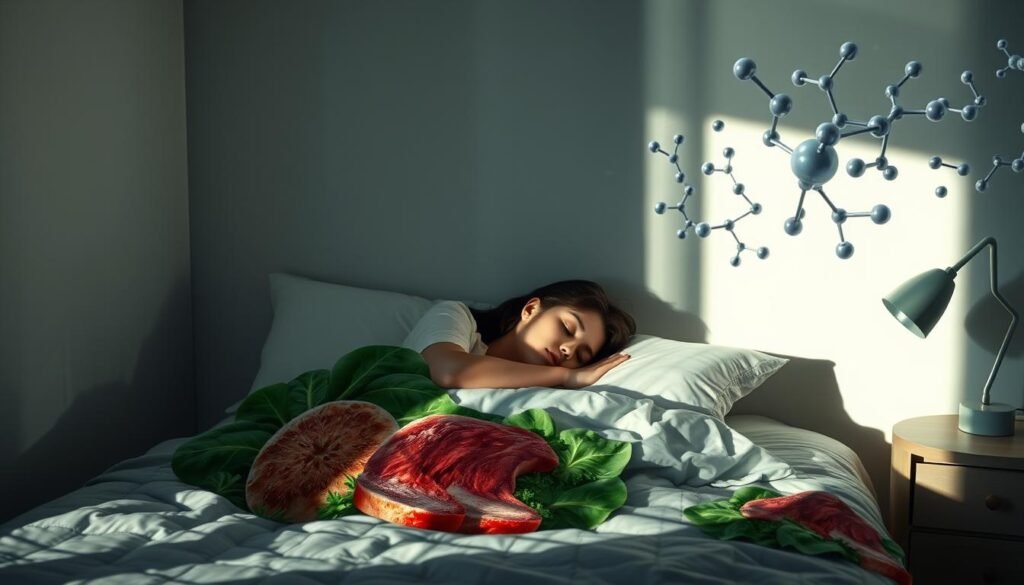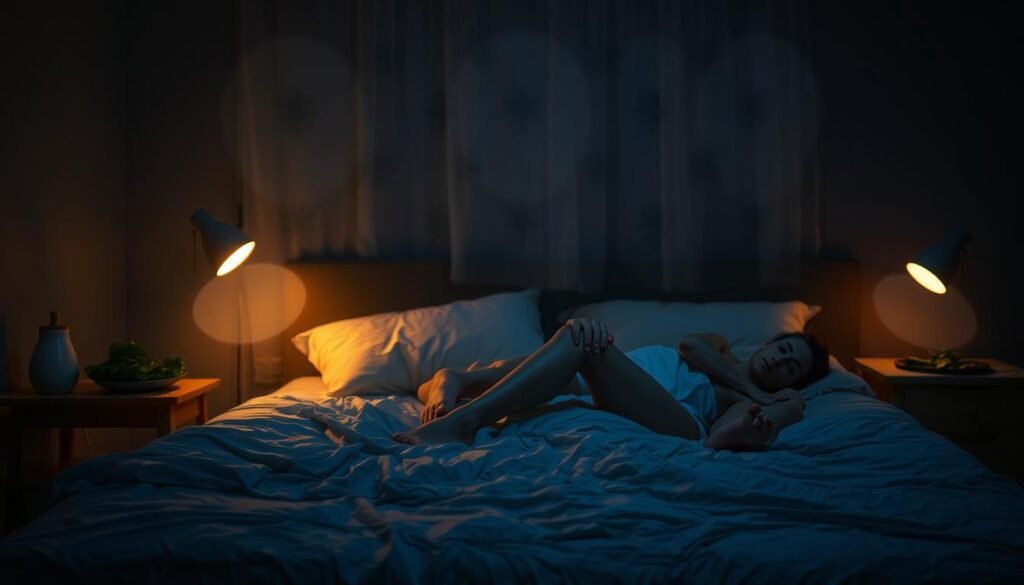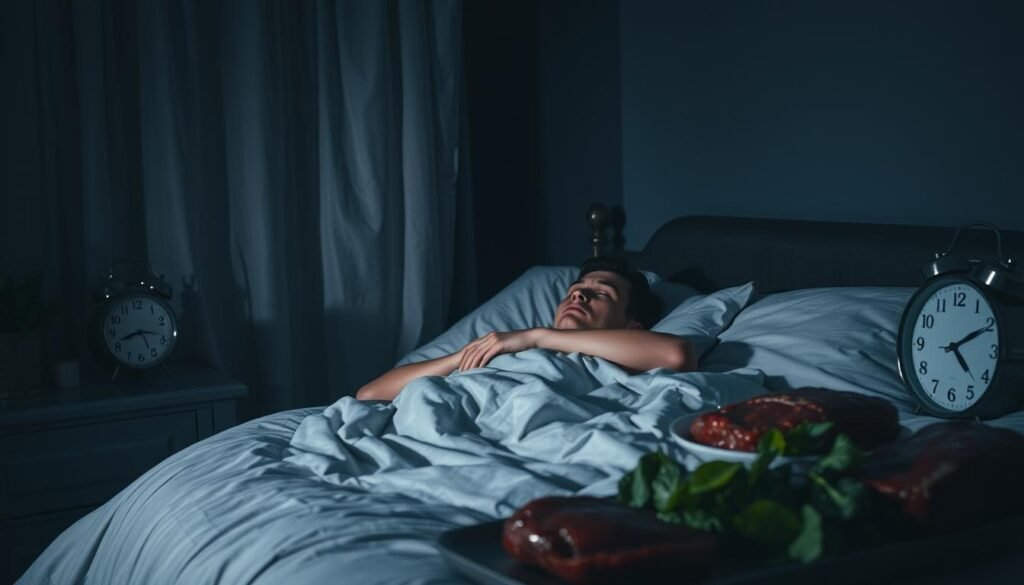Did you know about 25% of people worldwide have anemia? This condition is more than just tiring. It can also cause insomnia. The link between anemia and trouble sleeping is getting clearer. Many people with anemia struggle to get a good night’s sleep. They might not know anemia is the problem. Symptoms like feeling tired and weak can lead to insomnia. This affects health and day-to-day life greatly.
Key Takeaways
- Anemia affects approximately 25% of the global population.
- People with anemia are at a higher risk of developing insomnia.
- Iron deficiency anemia is a leading contributor to poor sleep quality.
- Untreated anemia can result in severe long-term health consequences.
- Insomnia leads to an estimated $63 billion in lost productivity annually in the U.S.
- About 50% of all anemia cases worldwide are due to iron deficiency.
Understanding Anemia and Its Impact on Health
Anemia means not having enough healthy red blood cells for good oxygen delivery. This issue, linked to many causes, affects about 25% of people worldwide. Symptoms include tiredness, weakness, and trouble thinking clearly.
Many things lead to anemia. Not getting enough iron is a common reason. This can come from a poor diet or problems absorbing it. Also, lack of vitamins, long-term diseases, and inherited conditions matter a lot. Anemia can harm your heart and how your body works.
In research with 1,105 people over 50, 10.5% had anemia but not from iron issues. This group had more sleep problems. They had higher scores on a sleep trouble scale. Compared to those without anemia, their risk of having many sleep issues was 2.20 times higher. It’s important to see how anemia and sleep problems are connected.
Knowing about anemia’s effects can help manage it better. Treatments can lessen symptoms, improving life for those affected. Iron supplements may help with sleep issues from low iron. More on this topic is at iron deficiency anemia and sleep issues.
How Anemia Affects Sleep Quality
Anemia’s link to sleep quality is a big issue for many. Our bodies need enough red blood cells to carry oxygen. If we don’t have enough, it can mess up our sleep. People with anemia feel tired, get anxious, and rest poorly at night. This bad sleep cycle is linked to the anemia sleep relationship. Restless leg syndrome and other sleep problems can make it harder to get good sleep.
Studies show that anemic people often have trouble sleeping. Iron deficiency anemia can cause breathing problems and sleep issues like night terrors and sleepwalking. Research suggests that treating iron deficiency anemia helps with insomnia. Taking iron supplements can especially help those who can’t sleep well because of anemia.
Those with iron deficiency anemia might find sleeping even harder. Restless legs syndrome can keep them awake. But eating foods rich in iron, like red meats, greens, and legumes, might help. It could improve their health and sleep. Learning about the impact of anemia on sleep is key to handling it well.

| Aspect | Effect of Anemia |
|---|---|
| Oxygen Supply | Reduced, leading to sleep cycle disruptions |
| Fatigue | Increases sleep disturbances and anxiety |
| Restless Legs Syndrome | Contributes to insomnia and poor sleep quality |
| Iron Supplementation | Potential improvement in insomnia symptoms |
| Dietary Changes | Enhancing iron levels may improve sleep quality |
Fatigue and Daytime Sleepiness
Anemia greatly affects how you function every day. If you have anemia, you might feel very tired all the time. This tiredness can make you very sleepy during the day. Your body struggles to carry enough oxygen, which makes you feel exhausted. This exhaustion keeps you in a cycle of not getting enough sleep.
Iron-deficiency anemia is known for making people feel constantly tired. Being too tired can actually make sleeping harder, worsening the quality of your sleep. For those fighting anemia fatigue, it’s crucial to manage your energy. This helps you sleep better at night.
It’s important to know the signs of fatigue from anemia. People with anemia may have trouble breathing, feel dizzy, and look very pale. Bad sleep can make the tiredness worse over time. It can also make it hard to think clearly and focus, adding to daily challenges.
Understanding the connection between anemia and daytime sleepiness can help find better sleep solutions. Making changes to your diet, getting more iron, and the right medical care can help ease the symptoms. This helps build a better sleep routine. Dealing with the main cause can boost your energy and allow for a more active life.
Restless Legs Syndrome (RLS) and Anemia
Restless Legs Syndrome (RLS) worries many, especially those low in iron. As many as 10% of people in the U.S. are affected. This condition leads to a strong need to move one’s legs, mainly at night. This can seriously disrupt sleep.
A link between RLS and anemia, particularly from not having enough iron, is well-documented. A study in Iran found that among textile workers, 21.2% of men and 69.5% of women had iron deficiency anemia. A staggering 78.2% of them reported having trouble sleeping, showing how anemia significantly affects sleep and health.
The average RLS score for these workers was 17.74 out of 42. Scores ranged from mild to moderate. A clear pattern was seen between iron levels and RLS scores. This shows improving iron levels could be key in managing RLS.
Treating RLS might include medications or iron supplements for those lacking iron. For some, boosting iron can lessen RLS signs. This can lead to much better sleep.

But it’s not all about medication. Simple actions like staying active and managing sleep can also reduce RLS issues. Knowing about RLS and its tie to anemia allows people to improve their life. Taking steps can help lessen sleep problems.
Anemia Cause Insomnia: Exploring the Connection
Anemia and insomnia might seem unrelated at first, but they are closely connected. A key factor linking them is iron deficiency. This condition messes up sleep patterns, leading to insomnia. People with low iron levels are more likely to have sleep problems, showing how anemia can cause insomnia.
The Role of Iron Deficiency in Insomnia
Iron plays a crucial role in our bodies, including how we sleep. Anemia means you don’t have enough healthy red blood cells, often due to not enough iron. This lack of iron can disrupt your sleep. Indeed, studies have shown that low iron levels are associated with more sleep disturbances.
Studies Linking Anemia and Sleep Disorders
A lot of research points to a connection between anemia and trouble sleeping. One study of 12,614 people in China found anemia sufferers had a higher chance of insomnia. Even after removing those with chronic inflammation from the mix, the link stayed strong. These results underline anemia’s role in sleep disorder discussions.

Symptoms of Anemia and Sleep Disturbances
Anemia causes symptoms that often look a lot like sleep problems. People with anemia feel tired, weak, and can’t catch their breath easily. They might also feel anxious. This makes it hard to fall asleep or stay asleep, because of anemia.
Those with anemia may also have trouble thinking clearly and feel moody. It’s important to spot these signs to understand how anemia affects sleep. Bad sleep can make anemia worse, so it’s key to treat both sleep troubles and anemia for good health.
| Anemia Symptoms | Sleep Disturbances Symptoms |
|---|---|
| Fatigue | Difficulty falling asleep |
| Weakness | Frequent awakenings |
| Shortness of breath | Restlessness at night |
| Anxiousness | Insomnia |
| Cognitive difficulties | Poor sleep quality |
| Mood disruptions | Daytime tiredness |
Long-Term Consequences of Untreated Anemia and Insomnia
Untreated anemia and insomnia can greatly harm your health over time. These two issues can mix, making both your body and mind suffer. If left unchecked, the health dangers from anemia can affect many body parts. It’s critical to deal with these problems early to avoid worse issues later on.
Physical Health Impacts
Having chronic anemia and not sleeping well can cause many health issues. Anemia lowers the oxygen in your blood, making your heart work harder. This can increase the chance of serious heart problems. Over time, anemia can also hurt how well other organs work by not giving them enough oxygen.
Not treating insomnia can make mental health worse, too. People with both issues often feel more anxious and depressed. This can lower their quality of life and even lead to more serious health risks. For example, not getting enough sleep and having low iron levels can make anxiety worse. Early help and treatment are key, as shown in studies like this one here.
As science gets better, it’s important to understand the long-term effects of not treating anemia and insomnia. This knowledge helps doctors improve care for those at risk. By finding ways to help, they aim to enhance patients’ lives and well-being.
Can Lifestyle Changes Improve Sleep in Anemia Patients?
Effective lifestyle changes can really help those with anemia sleep better. Simple changes in daily habits can improve health and sleep.
An iron-rich diet is key to these changes. Eating leafy greens, legumes, lean meats, and fish boosts iron levels. This improves hemoglobin, which can reduce fatigue and improve sleep. Drinking more water and less caffeine also helps your body use these nutrients and can lead to better sleep.
Being active is also crucial. Moderate exercise like walking, yoga, or cycling can help you relax. It reduces stress and can improve your sleep pattern greatly.
Here’s a summary of beneficial lifestyle changes for improving sleep in anemia patients:
| Lifestyle Change | Benefit |
|---|---|
| Iron-Rich Diet | Enhances hemoglobin levels; boosts energy |
| Hydration | Aids in nutrient absorption; promotes better sleep |
| Avoiding Caffeine | Reduces interference with iron uptake |
| Regular Exercise | Improves relaxation and sleep patterns |
By adopting these changes, people with anemia can not just feel better overall but also sleep better. Eating right and staying active lead to a restful, healthier life.
Conclusion
The link between anemia and not sleeping well is key for keeping good sleep health. Knowing anemia’s signs is crucial because it really messes with how well you sleep. Anemia can make you sleep less, shown by research linking more hemoglobin to longer sleep. This connection is vital for parents and doctors to get.
To improve sleep, treating anemia is a big step. Eating foods rich in iron and talking to doctors can help a lot. By addressing anemia, people not only sleep better but also see their life quality boost.
More research is needed to see how anemia affects sleep over time. By understanding how they’re connected, we can find better ways to handle both. This could improve health and happiness for everyone, no matter their age.